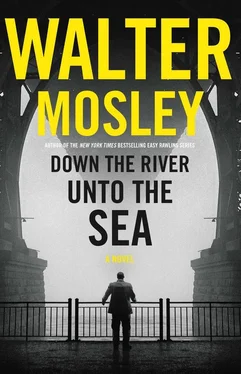Mostly but not all white, they stared, read newspapers, talked to themselves or others. Sprawled out, leaning on canes, and trapped in wheelchairs, they napped, dozed, cried, and muttered. The room smelled strongly of urine, dead skin, alcohol, and disinfectant.
I walked down the aisle of tortured souls, a modern-day Dante wandering through a half-hearted beach resort in hell. The inmates reached and called out to me. They watched as I went by, wishing, I believed, that they had the strength to walk away from their private damnation.
“Can I help you?” asked a blue-haired lady in nurse-like white. She was somewhere in her sixties, which made her the second-youngest person in the room.
“Lamont Charles,” I said.
The short, well-preserved white woman’s face brightened and she gave a smile usually reserved for grandchildren and fond memories of the dead.
“Mr. Charles,” she said as if the words were a mantra designed to open the gates of heaven.
“Yes. Can he have visitors?”
“I don’t know why he doesn’t have more. If we had a dozen like him I think we might get something accomplished.”
I had no idea what she meant but asked, “Can I see him?”
The small elevators at Aramaya were in constant use so I took the stairs to the third floor and followed the receptionist’s directions to the recreation room.
It was a large area with a succession of windowed doors leading out onto a deck that looked over the ocean.
This room was a maze of sofas, chairs, wheelchairs, and game tables. There were at least forty residents in the same sad shape as their brethren downstairs. I looked around for a somewhat younger man, three-quarters paralyzed.
“Can I help you?”
The question was asked by a twenty-something black man with bulging muscles and an orderly’s teal garb. He had the use of all his limbs.
“Lamont Charles.”
He was the only person out on the deck. It was a mild day, maybe fifty-five degrees, with a toothless breeze wafting through. Lamont was sitting in an electric wheelchair, holding a mirror in front of his face with his one good hand. He’d put down the mirror, pick up a comb, run this through his hair, and then retrieve the mirror to examine his work so far.
“Mr. Charles?” I asked.
Still looking at himself, he said, “Yes?”
“My name is Oliver, Joe Oliver.”
I moved between him and the view of the ocean.
After a moment he looked up and said, “Cop?”
“Used to be. A long time ago. Now I’m private.”
He put down the mirror and smiled like he used to in the old days before being shot down.
“You like it out here?” he asked. You could hear North Carolina in his voice.
“A little chilly.”
“That’s why I got me two blankets. You know the smell’a that place back there is bound to be bad for you. So I come out here every day to clean out my lungs. I don’t care how cold it gets, a red-blooded man needs fresh air.”
A seagull swooped down and landed on the railing maybe a dozen feet from us. It gave us its sidelong glance, hoping for crumbs or maybe a discarded fish.
“Why you here, Mr. Oliver?”
“I’ve been asked to look into the conviction of A Free Man. There are those who believe he was set up to be killed and then, when that failed, framed.”
“You got ID?”
I held up my PI’s license in its leather folder.
“Hand it here,” Lamont said.
He took the ID and held it like he had the mirror. Then he sniffed and handed it back.
“Manny’s on death row, brother. What you think anybody could do ’bout that?”
“Maybe prove that Valence and Pratt were dirty and that they not only tried to kill Man, but they also killed, and in your case wounded, most of the rest of the Blood Brothers of Broadway.”
Charles’s right eye started fluttering. His smile turned, momentarily, into a sneer.
“Hurts like a mothahfuckah, you know, man?” he said.
“What does?”
“This pain in my back. They prescribed oxycodone, but I only take it on the weekends. I only take it then ’cause everybody deserves a li’l peace sometimes.”
I didn’t know what to say. I felt bad for lamenting a few months in solitary confinement compared to what Lamont and all the other residents of Aramaya were experiencing.
“Who hired you?” Lamont asked.
“I can’t say.”
“Manny know you on the job?”
“Not yet.”
The smile came back to the gambler’s lips.
“You know once the state sentences a man to death you got to have DNA evidence or Jesus himself got to climb up out the ground.”
“DNA won’t help here,” I said.
“And J.C. busy,” Lamont agreed.
He looked past me over the water and I leaned back to perch on the weatherworn wood rail.
“What happened to you, Mr. Charles?”
That was the right question. He wasn’t going to worry about anybody but the man in his mirror.
“They shot me in the back,” he said. “Shot me five times and ran. They didn’t know how lucky I was, must’a thought I cheated at cards.”
“Gamblers shot you?”
“Fuck no. A gambler would give me a head shot. Any gambler know me knows my luck. Shit. I win when I wanna be losin’.”
“Was it Valence and Pratt?”
“Or somebody they worked with,” Lamont said. “They killed all the rest’a my friends, Lana’s in prison, and Tanya’s missin’ — prob’ly dead. I say a prayer to Manny every night for gettin’ us some justice. You know them cops was bad, from drugs to hos. And you better believe they didn’t give a damn.”
“What did they do?”
“Sold drugs to kids and kids to child molesters. Then they blackmailed the child molesters. They took over private business like gamblin’ and killed anybody aksed why. Manny was a war hero and schoolteacher. How a mothahfuckah like that gonna turn his head an’ forget?”
“Sometimes people like that work with people like those cops,” I suggested.
I was trying to get Lamont angry, out of his game. But he just grinned.
“You think he decided to make a clubhouse for the triple B and invite kids to play snooker and do their homework because he wanna turn ’em out? That’s a white man’s game, man. When seven brothers and sisters get together to help po’ kids that’s just what they doin’. An’ you was a cop so you know it’s true.”
I had my doubts, but what stumped me was Lamont seemed to be telling the truth.
“If you people were so poor and so innocent, then how do you pay for this rest home?” I put to him. “This shit cost maybe a thousand dollars a week.”
“Thirteen hundred sixty-fi’e dollars,” he corrected.
“You win that at bingo?”
“I’m a gambler but I’m no fool, Mr. Oliver. I had me lifetime-care health insurance since my brother Andrew died in my house from lung cancer. Took him seventeen months to pass on. Me and him and his wife, Yvette, lived in my one room. Make this place look like Disneyland.”
“If you and the other Blood Brothers weren’t competing with the cops, then why they come down on you like that?”
“Why any American go to war?” he said. “We was fuckin’ with they business. We talked to the girls and boys they prostituted and organized marches in front of stores they protected. Manny hired a lawyer to sue the city. He thought that that would keep us safe from reprisals.” Lamont grunted a laugh. “Mr. Man was a optimist... no, no, he was a idealist. He believed in what he was doin’ and he got you to believe it too.”
“Who was the lawyer?” I asked.
“Rose Hooper.”
“Manhattan practice?”
“Used to be. Bein’ a lawyer I suppose that she now sits court in hell.”
Читать дальше









